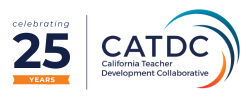Leaders of Change: Profiles from BATTI’s New Leadership Program
In 2015, BATTI launched an innovative new Educational Leadership program, designed to support Bay Area educators who were ready to move into a leadership role. The two-year program allows aspiring school heads, principals, division heads, administrators and teacher-leaders to gain a Master’s Degree tailored to their unique goals and to support their current work at their schools.
Schools today are faced with new demands as a result of the 21st century’s massive interconnectedness, diversity of perspectives, global economic change, rapid technological revolutions, and ethical dilemmas. Educators must be less focused on management, more focused on innovation and implementation to meet the challenges of the future. The Educational Leadership program draws on BATTI’s fundamental values, successes and relationships: mentorship, small cohorts, school partnerships, and careful and personalized design. BATTI’s commitment to “learning by doing” prepares graduates for long-term success in a diversity of challenging environments.
This May, the first cohort will graduate from the program. We asked two of the school leaders about their experiences and their goals for the future.
Danny Scuderi
As the Humanities Department Head and Language Arts teacher, I’m responsible for coordinating cross-curricular projects between the middle school Language Arts and Social Studies departments and for designing the scope and sequences of the middle school Language Arts curriculum.
Some of the greatest rewards (of my work) revolve around the very nature of being a teacher-leader. I am able to make decisions and effect change on a slightly larger scale while also being able to see the effects of those decisions in the classroom.
School leaders need to be effective and efficient communicators and active listeners as well. I’ve learned through BATTI that at times, the people we are talking to simply want to be heard and heard fully; there may not be an explicit need to respond. Knowing when to speak and when to listen is important.
A BATTI field trip at IDEO led to a White House visit! Joining the IDEO Teachers Guild led to a Facebook hack-a-thon, whereby four other teachers and I built as much of our idea as possible along with a team of professional designers and engineers. That amazing experience led to being invited to the First Lady’s Beating the Odds education summit at The White House, a celebration of students who beat the odds to get into college. We helped facilitate workshops for these students and met the First Lady at the White House. Both were equally powerful.
Danny Scuderi
Humanities Department Head
Marin Horizon School
Sarah Neidhart
After working in group homes with children and young adults, I decided to get my Teaching Credential because I wanted to ensure that all students had access to an education that was delivered through kindness and respect.
I have learned so much in the past year (1st year as a school principal and 1st year in the Ed Leadership program). Leaders need to be able to negotiate with all stakeholders and to do that I’ve needed to be firm on what my values are and clear about my reasons for supporting an initiative. As a leader you need to know that there are times people will not like the direction you are going or decisions you have made. You also need to decide how you are going to deal with that criticism. You need to be able to sort out what is constructive and what is not and where you can build bridges between ideas.
The greatest reward of being in leadership is the effect you can have on the learning of children, both academic and emotional. I have also thoroughly enjoyed being able to build relationships with teachers across my school to broaden curricular knowledge and ensure vibrant and meaningful learning experiences for our students. To be a school leader today you have to be adaptive in a changing educational environment. Along with the other two principals in my district, I just did a Parent Night on the Common Core State Standards. At this event we were talking about how 65% of the jobs our students will have, have not been created yet. It is important to embrace 21st century learning (communication, collaboration, critical thinking, and creativity) so that our students are prepared for future learning and careers.
Sarah Neidhart
Principal, Panorama School
Brisbane School District
